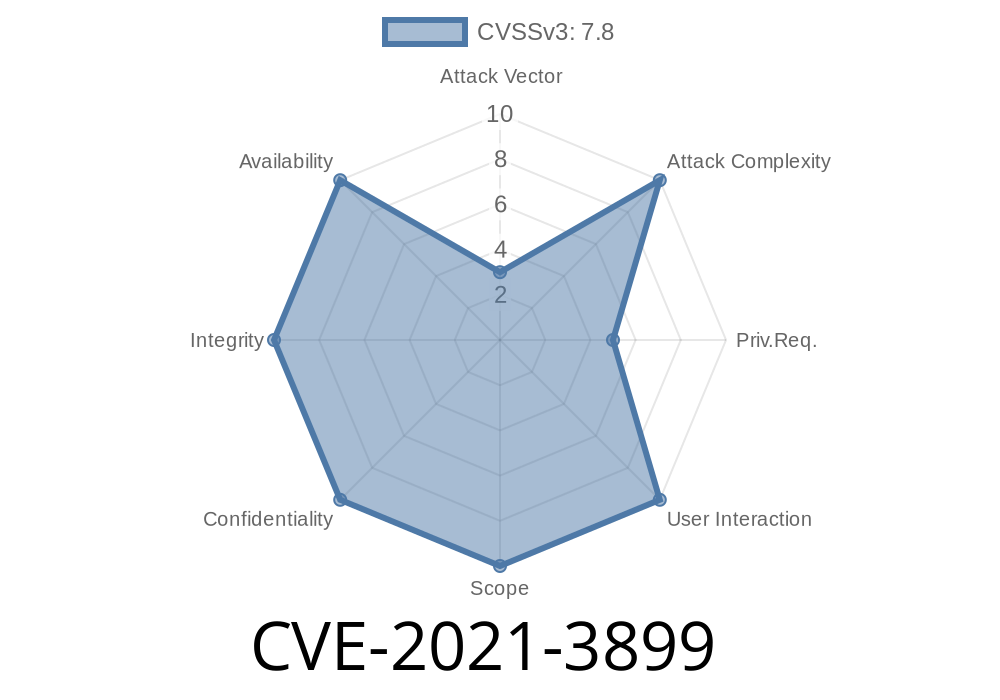Security vulnerabilities don’t always need complicated tricks; sometimes, the tiniest window, like a race condition, can be catastrophic. That's exactly what we saw with CVE-2021-3899 — a flaw that allowed attackers to gain root by exploiting a timing issue in the ‘replaced executable’ detection mechanism. In this post, I’ll break down what this bug is, show you real code snippets, discuss the conditions for exploitation, and give you references for digging deeper.
What is CVE-2021-3899?
CVE-2021-3899 describes a race condition bug affecting certain Unix-like systems. The vulnerable logic tried to check if an executable file had been replaced on disk. If an attacker managed to sneak in and swap the executable at just the right moment, they could get the system to run an arbitrary program as root.
This vulnerability is pretty serious, and easy to overlook if you aren’t thinking about multi-process timing.
Where Did It Happen?
It happened in the way programs (like backup scripts, system daemons, or packaging tools) check if the binary they’re running matches what’s on the disk. They typically do this by examining things like the inode and device, then comparing those to what’s currently open.
Here’s an abstracted version
int is_replaced_executable(const char *path, struct stat *original_stat) {
struct stat current_stat;
if (stat(path, ¤t_stat) < ) {
return 1; // File might be gone/replaced
}
if (current_stat.st_ino != original_stat->st_ino ||
current_stat.st_dev != original_stat->st_dev) {
// The executable file has been replaced
return 1;
}
return ; // Still the same file
}
What’s the problem here?
If an attacker can swap out the file between the two operations (after the stat but before the program actually executes), they may trick a process into running code of their choosing.
Attacker has local access (usually to an unprivileged account).
2. A privileged process, such as a package manager or system operator script, is configured to allow certain users to run binaries as root.
3. The attacker replaces the target executable with a malicious version during the tiny window between the program checking and running the binary.
Example: Simulated Exploit PoC
Suppose there’s a setuid-root binary, /usr/local/bin/backup.sh, and the system uses a check like above.
# While a privileged process does this...
stat /usr/local/bin/backup.sh
# ...the attacker does this:
while true; do
cp malicious_backup.sh /usr/local/bin/backup.sh
cp legit_backup.sh /usr/local/bin/backup.sh
done
With enough tries, and the right timing (race!), the malicious version might get run with root privileges.
Persistence: The attacker can plant backdoors.
- Stealth: This can happen in the blink of an eye and is hard to detect unless you’re watching for it.
References
- Red Hat Security Advisory RHSA-2021-3899
- Original bug report (Red Hat Bugzilla)
- NVD: CVE-2021-3899 at NIST
What Should You Do?
- Update your system: Vendors fixed this by improving atomicity and using file descriptors (not just file paths) to reference binaries, making it impossible to swap the file unexpectedly.
- Use safe patterns: When checking a file before executing it, hold the file open using a file descriptor instead of referencing it by path over and over.
Final Thoughts
Race conditions like CVE-2021-3899 are notorious because they often go unnoticed by developers and attackers alike — until it’s too late. If you’re developing code that runs with high privileges, make sure to use atomic operations and avoid temporal file checks. One tiny timing issue can mean a world of trouble.
Stay patched and stay vigilant!
Author’s Note:
This post is based on analysis of public advisories and technical reports. For real-world usage, always consult your distribution notes and security team. Don’t try this on any system you care about!
Timeline
Published on: 06/03/2024 19:15:08 UTC
Last modified on: 08/19/2024 14:35:00 UTC
